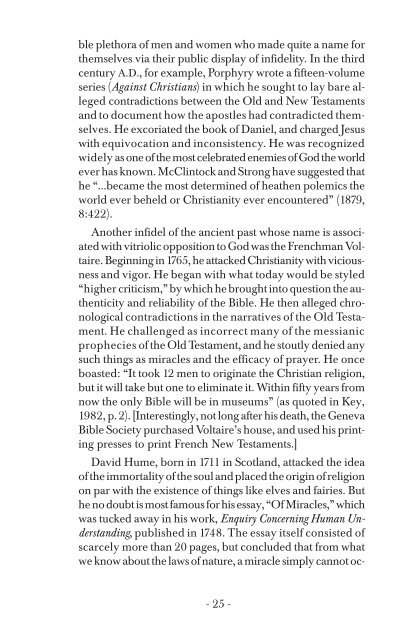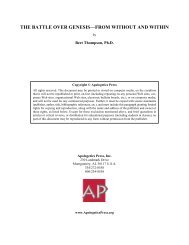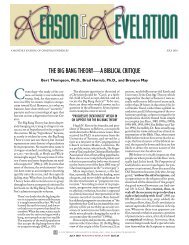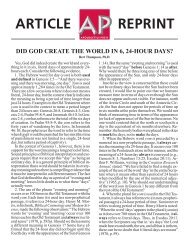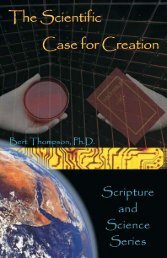The Many Faces, and Causes, of Unbelief - Apologetics Press
The Many Faces, and Causes, of Unbelief - Apologetics Press
The Many Faces, and Causes, of Unbelief - Apologetics Press
Create successful ePaper yourself
Turn your PDF publications into a flip-book with our unique Google optimized e-Paper software.
le plethora <strong>of</strong> men <strong>and</strong> women who made quite a name for<br />
themselves via their public display <strong>of</strong> infidelity. In the third<br />
century A.D., for example, Porphyry wrote a fifteen-volume<br />
series (Against Christians) in which he sought to lay bare alleged<br />
contradictions between the Old <strong>and</strong> New Testaments<br />
<strong>and</strong> to document how the apostles had contradicted themselves.<br />
He excoriated the book <strong>of</strong> Daniel, <strong>and</strong> charged Jesus<br />
with equivocation <strong>and</strong> inconsistency. He was recognized<br />
widely as one <strong>of</strong> the most celebrated enemies <strong>of</strong> God the world<br />
ever has known. McClintock <strong>and</strong> Strong have suggested that<br />
he “...became the most determined <strong>of</strong> heathen polemics the<br />
world ever beheld or Christianity ever encountered” (1879,<br />
8:422).<br />
Another infidel <strong>of</strong> the ancient past whose name is associated<br />
with vitriolic opposition to God was the Frenchman Voltaire.<br />
Beginning in 1765, he attacked Christianity with viciousness<br />
<strong>and</strong> vigor. He began with what today would be styled<br />
“higher criticism,” by which he brought into question the authenticity<br />
<strong>and</strong> reliability <strong>of</strong> the Bible. He then alleged chronological<br />
contradictions in the narratives <strong>of</strong> the Old Testament.<br />
He challenged as incorrect many <strong>of</strong> the messianic<br />
prophecies <strong>of</strong> the Old Testament, <strong>and</strong> he stoutly denied any<br />
such things as miracles <strong>and</strong> the efficacy <strong>of</strong> prayer. He once<br />
boasted: “It took 12 men to originate the Christian religion,<br />
but it will take but one to eliminate it. Within fifty years from<br />
now the only Bible will be in museums” (as quoted in Key,<br />
1982, p. 2). [Interestingly, not long after his death, the Geneva<br />
Bible Society purchased Voltaire’s house, <strong>and</strong> used his printing<br />
presses to print French New Testaments.]<br />
David Hume, born in 1711 in Scotl<strong>and</strong>, attacked the idea<br />
<strong>of</strong> the immortality <strong>of</strong> the soul <strong>and</strong> placed the origin <strong>of</strong> religion<br />
on par with the existence <strong>of</strong> things like elves <strong>and</strong> fairies. But<br />
he no doubt is most famous for his essay, “Of Miracles,” which<br />
was tucked away in his work, Enquiry Concerning Human Underst<strong>and</strong>ing,<br />
published in 1748. <strong>The</strong> essay itself consisted <strong>of</strong><br />
scarcely more than 20 pages, but concluded that from what<br />
we know about the laws <strong>of</strong> nature, a miracle simply cannot oc-<br />
-25


